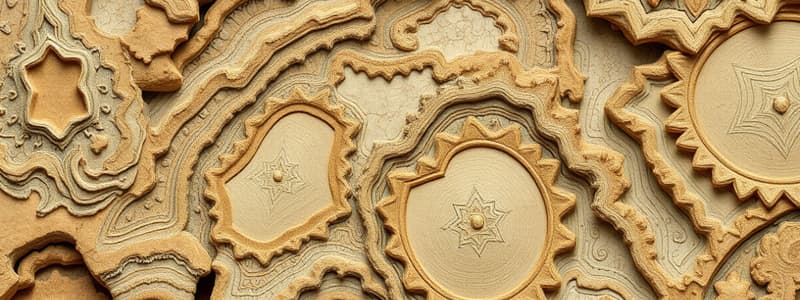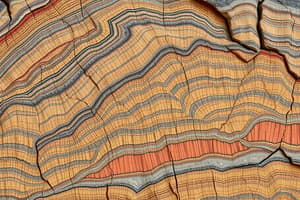Podcast
Questions and Answers
How are metamorphic rocks classified?
How are metamorphic rocks classified?
Metamorphic rock is classified by texture and composition. The texture can be foliated or nonfoliated.
What is foliation?
What is foliation?
The planar (nearly flat) arrangement of mineral grains or crystals within a rock.
What does foliation indicate about the history of a rock?
What does foliation indicate about the history of a rock?
What are the different metamorphic agents?
What are the different metamorphic agents?
What is regional metamorphism?
What is regional metamorphism?
What is contact metamorphism?
What is contact metamorphism?
Where in the earth do regional and contact metamorphism occur?
Where in the earth do regional and contact metamorphism occur?
What is protolith?
What is protolith?
Why is protolith important?
Why is protolith important?
What common metamorphic rocks result from regional metamorphism?
What common metamorphic rocks result from regional metamorphism?
What common metamorphic rocks result from contact metamorphism?
What common metamorphic rocks result from contact metamorphism?
What is metamorphic grade?
What is metamorphic grade?
What is blueschist metamorphism?
What is blueschist metamorphism?
Where in the earth does blueschist metamorphism happen?
Where in the earth does blueschist metamorphism happen?
What is contrast lithostatic pressure?
What is contrast lithostatic pressure?
What is differential stress?
What is differential stress?
What are the two kinds of differential stress?
What are the two kinds of differential stress?
What is an example of a low grade mineral?
What is an example of a low grade mineral?
What is the classification of metamorphic rocks based on?
What is the classification of metamorphic rocks based on?
Flashcards are hidden until you start studying
Study Notes
Metamorphic Rock Classification
- Metamorphic rocks are classified based on texture (foliated or nonfoliated) and composition.
Foliation
- Foliation refers to the planar (nearly flat) arrangement of mineral grains or crystals within a rock, indicating a specific alignment due to pressure.
Historical Significance of Foliation
- Foliation signifies the deformation history of a rock, revealing the conditions under which it was formed.
Metamorphic Agents
- Key agents of metamorphism include heat, pressure (stress), and chemically active fluids, often acting simultaneously during rock transformation.
Regional Metamorphism
- Regional metamorphism occurs over extensive areas subjected to high deformation and differential stress, resulting in strongly foliated rocks like slates, schists, and gneisses.
Contact Metamorphism
- Also known as thermal metamorphism, it occurs in Earth's upper crust where rocks near molten igneous bodies are exposed to high temperatures, leading to non-foliated metamorphic rocks due to lack of directional stress.
Protolith
- Protolith refers to the original, unmetamorphosed rock from which a metamorphic rock forms, playing a crucial role in determining the characteristics of the resulting metamorphic rock.
Importance of Protolith
- Understanding the protolith is essential as it influences the mineral composition and physical properties of the metamorphic rock that develops from it.
Common Rocks from Regional Metamorphism
- Typical metamorphic rocks arising from regional metamorphism include schist and gneiss, characterized by their pronounced foliation.
Common Rocks from Contact Metamorphism
- Contact metamorphism typically produces non-foliated rocks such as marble and quartzite, which form under high temperature but low pressure conditions.
Metamorphic Grade
- Metamorphic grade indicates the relative temperature and pressure conditions experienced by a rock during metamorphism, influencing its mineralogy and texture.
Blueschist Metamorphism
- Blueschist metamorphism occurs under specific conditions of high pressure and low temperature, leading to the formation of blueschist rocks, typically found in subduction zones.
Lithostatic Pressure
- Contrast lithostatic pressure refers to uniform pressure exerted on a rock mass from all directions, influencing metamorphic processes.
Differential Stress
- Differential stress is a result of tectonic forces where pressure differs in particular directions, leading to deformation in the rock structure.
Types of Differential Stress
- Two kinds of differential stress are normal stress, which acts perpendicular to a surface, and shear stress, which acts parallel to a surface.
Low Grade Minerals
- An example of a low-grade metamorphic mineral is schist, indicating formation under relatively low metamorphic conditions.
Classification Basis
- The classification of metamorphic rocks is based on their composition and texture, which provide insights into their formation and history.
Studying That Suits You
Use AI to generate personalized quizzes and flashcards to suit your learning preferences.



